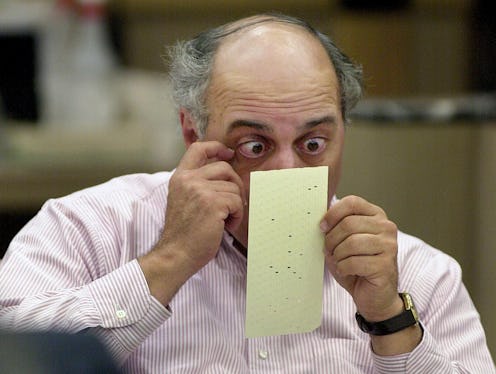News
Independent Voters Are Out Of Luck In D.C. Primary
As all eyes turn to the nation's final primary ahead of July's partisan conventions, voters in the District of Columbia and those watching from outside need to know: can independents vote in the D.C. primary on June 14? Unfortunately, independents can't vote in this month's Democratic primary in the capitol. D.C. has a closed primary, meaning that only those who are registered as Democrats can vote in the primary (the district's Republican contest was held on March 12; Marco Rubio won prior to dropping out).
Second only to interest in delegate math, this election season has garnered unprecedented interest in the open vs. closed primary debate, due largely to Sen. Bernie Sanders' and his supporters following the revelation that New York's closed primary had an October party registration deadline.
Independents have been key in Sanders' presidential bid, representing a formerly untapped-into minority of voters seemingly fed up with "the Democratic establishment". As such, open primaries, or those that don't require that voters already be registered either Democrat or Republican to vote on either party's primary ballot, have been said to benefit Sanders, while closed primaries, the logic holds, would benefit Clinton. Despite comments to the contrary, that logic is flawed — the "closed primaries hurt Sanders and benefit Clinton" claim doesn't accurately represent Clinton's lead in delegates as the former Secretary of State and Sanders have both had significant wins in closed primaries (and caucuses, which are by default closed as they're sponsored by the parties rather than the state) as well as open.
Bernie Sanders vowed in a May NPR interview to stay in the race "until the last vote is counted" in D.C. More recently, he remarked on the campaign trail in Santa Cruz, CA ahead of the California primary that the June 7 primaries won't determine the nominee despite delegate math in Clinton's favor, a claim based in reports that Sanders is hoping to grab superdelegates, or unpledged delegates who vote as they choose, ahead of the Democratic National Convention in Philadelphia on July 25. Sanders also said he has enough money to campaign after the primaries all the way to the convention.
While Sanders continues to push against a presumed Clinton nomination, Clinton herself began campaigning against Donald Trump weeks before the California and New Jersey primaries, a move that signals a belief that Clinton is the presumptive Democratic nominee.
As the country hurls towards July's partisan conventions and one of the most anxiety-inducing general elections in recent memory, the drawn-out Clinton-Sanders battle may very well be a battle for the soul of the Democratic party. While Sanders pushes for an eleventh-hour nomination and Clinton gears up to fight against Trump, it's easy to wonder: what direction will Americans take on November 8?
